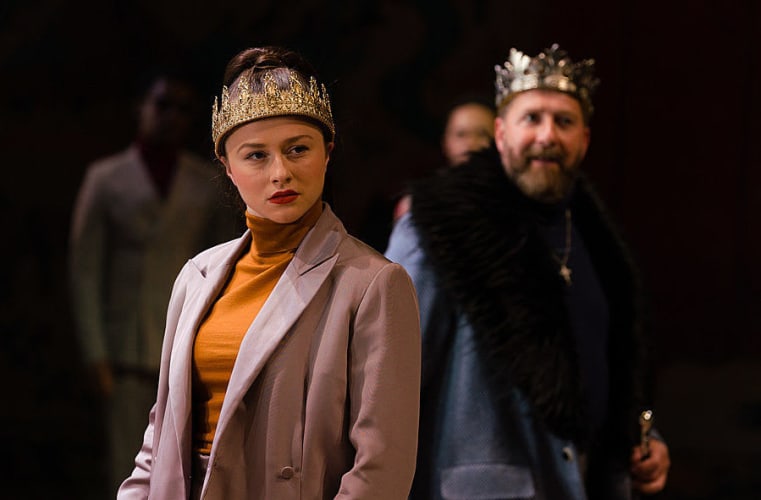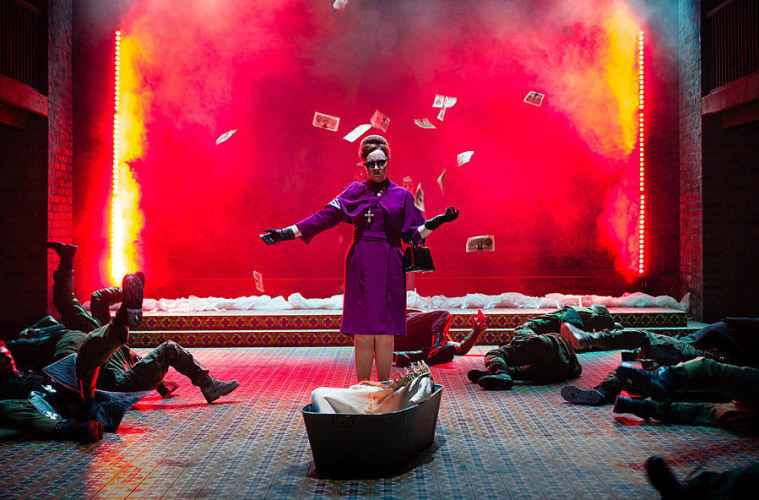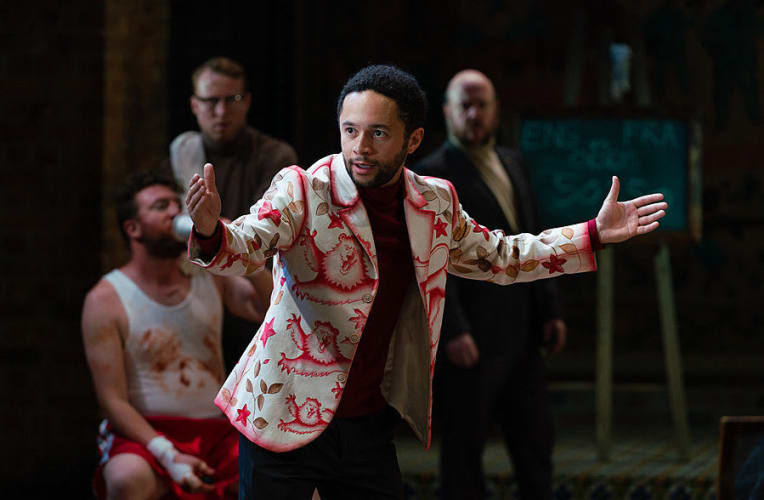John emerges with a hangover. And when he and his boop-do-doop freebooters cross the Channel, the King of France’s disdainful expression says it all, as if a bunch of football hooligans had camped in Notre-Dame.
It looked as if they were going to boogie their way to death or glory, but director Eleanor Rhode’s production grew on me, and the realisation of how flippantly power disposes of lands and lives. A confrontation takes the form, literally, of a bun fight, David Birrell’s French king Philip emerging with one impaled on his crown, and a dollop of crème fraiche on le nez.
It reminded me of the RSC’s most recent outing of the play, Maria Aberg’s 2012 fru-fru frock and latex balloons frolic. Indeed, the expedient betrothal of Brian Martin’s Dauphin and John’s niece Blanche, played by Nadi Kemp-Sayfi with exemplary distaste, is marked with balloons spelling "Just married", soon converted in the coming conflict to "Just die".
The costumes are 1950s, but there’s a timelessness in the set, dominated by a wall-hanging that looks as the Bayeux tapestry might if done by Grayson Perry—an age-spanning chronicle of longbowmen and helicopter gunships.
But designer Max Johns’s most brilliant effect comes at the start of the second half as a great coronet of light and sovereignty that has hung over proceedings hitherto descends literally and metaphorically to encircle a semi-religious murder rite.
It’s the emotional heart of the drama and breath-stoppingly wonderful it is thanks to Tom McCall as the soul-searching Hubert and young Ethan Phillips playing his intended victim, Arthur, with commendable restraint.
What passion there is too in Charlotte Randle’s Constance, Arthur’s mother, mourning his loss. "Grief fills the room up of my absent child," she moans, and the cry seems to reach the heavens. It’s such an outpouring of pain that it’s one reason experts think Shakespeare wrote the play shortly after the death of his only son, Hamnet.
If that is the soul of the piece, Michael Abubakar provides the calculating brain, as Richard Lionheart’s illegitimate son, The Bastard, a cynical observer who condemns ‘commodity’—political self-interest—only as long as he’s unable to benefit from it. Taunting, provoking, he circles his social superiors with jabbing accusations, keeping just out of range of reprisal.
Detractors find King John uneven—a qualification I’d make about this production rather than the play itself, which I’ve always enjoyed and found easily accessible. Cardinal Pandulph, for example, played with Northern drollery by Katherine Pearce, is turned into a handbag-toting figure of ridicule—good for a laugh, but diminishing conviction in the awful power of the Pontificate to command monarchs and conjure up bloody war.
Chiefly, I was unconvinced by the choice of Rosie Sheehy as King John. Gender neutrality is the norm in RSC casting these days, and there’s nothing wrong with the idea of a female mediaeval monarch—Matilda was around 30 years before John.
Sheehy is at her best in the final moments, racked by rebellion, poison and guilt. Until then, she struts and shouts with assumed manliness. But this was a weak king, a soldier who went to war for lands he then gave away on a caprice. Whereas a male actor might tone it down, Sheehy had to max the volume throughout. As a result, I didn’t feel the subtlety, the shallowness, the ‘commodity’ that characterised every word and gesture of her French counterpart, the excellent Brian Martin.
There’s a discordant note at the end, too. The play ends, famously, with an ode to patriotism and England’s invincibility if "to itself do rest but true." Awkward. That would never do these days and Rhode understandably has the scene quickly revert into bloodshed.
But then the effect is spoilt as among the carnage arises Arthur, dead in the play and in history, with no heirs. So this can be no Malcolm-style inheritance as in Macbeth. A figure of innocence reborn—possibly—but that goes against the spirit of this magnificent monument of political scepticism.
King John will be broadcast in cinemas on Wednesday 29 April 2020.


